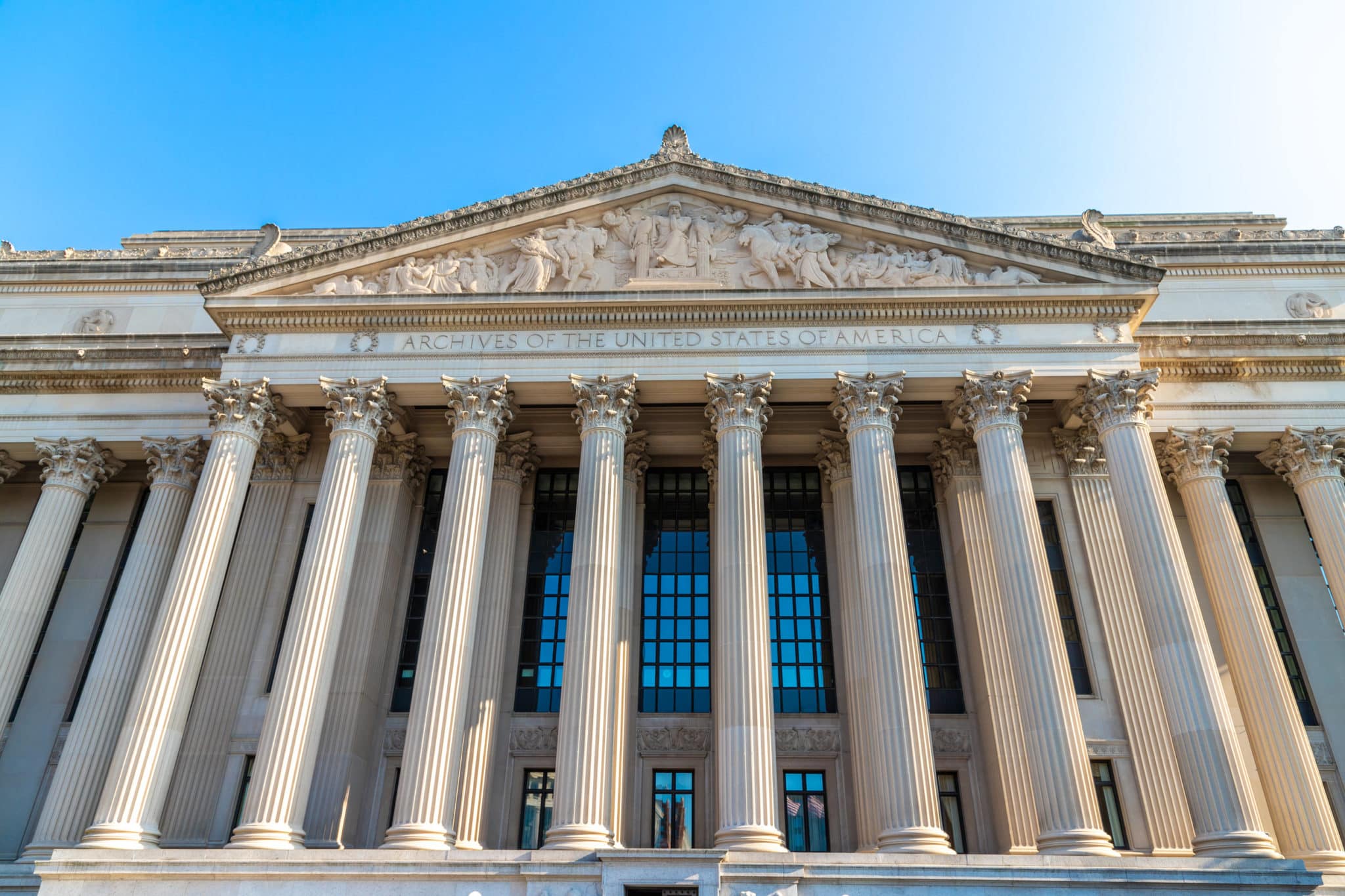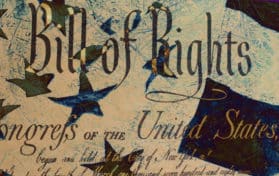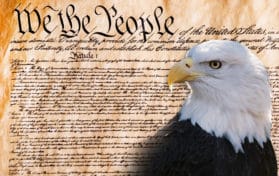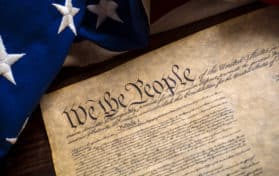
Likely most all Americans have learned how American independence was won; most English classes study the speeches of notable historic figures such as Patrick Henry. Washington was an apt and able general who led the War for Independence, but only reluctantly accepted the role as the nation’s first president.
The Bill of Rights is another topic most history classes cover; however, most teachers don’t elaborate on the individuals who lobbied for the inclusion of these enumerated rights into the Constitution. In fact, some of the most vocal leaders for liberty were against the proposed Constitution, and for good reason.
These individuals wrote a series of papers known as the Anti-Federalist Papers, and they were integral in the addition of the Bill of Rights to the Constitution.
What are the Anti-Federalist Papers?
Most high school students have studied pieces of a collection that came to be known as The Federalist Papers. However, many Americans might not realize that a lesser known counterpart of the collection exists; this group of works is known as The Anti-Federalist Papers.
The name given this collection of works is truly a misnomer. In fact, the collection of essays labeled the anti-federalist papers actually served to shape the Bill of Rights. The writers in the collection were not anti-government as the name might imply; rather, they believed in a small, centralized (federal) government that gave citizens the rights we have today.
This collection was written by several of the Founding Fathers, including Patrick Henry. That’s right – the same individual whose quote “Give me liberty, or give me death!” spurred much of the emotion behind the American Revolution was a noted Anti-Federalist!
Henry and several other Founding Fathers were opposed to some of the language in the Constitution as it was written in 1787, and they wrote papers to that effect. These papers would become The Anti-Federalist Papers. These papers would eventually lead to the drafting of the previously mentioned Bill of Rights, which enumerates what rights we Americans have.
Without the Bill of Rights, the original wording of the Constitution could have given the federal government unlimited power. This means that citizens themselves would lose many of the freedoms that the Founding Fathers clamored so diligently to win.
It also specifies certain things that the federal government cannot do in regards to its citizens.
What did the Anti-Federalist Papers say?
The authors of the various anti-federalist essays are numerous, but they all seemed to resound the same theme. The anti-federalists were concerned about the size and scope of a central government. Most are thought of as “localists” who “fear(ed) a powerful central government.”
These individuals collectively believed that for a democracy to succeed, people must have direct participation in the workings of the government. Interestingly enough, many of these individuals expressed an overall distrust in the very wealthy, particularly merchants and industrialists.
Some titles included in the collection of The Anti-Federalist Papers include “A Dangerous Plan of Benefit only to the ‘Aristocratick Combination” and “New Constitution Creates a National Government; Will Not Abate Foreign Influence; Dangers of Civil War and Despotism.”
The collection of anti-federalist papers spoke on several common themes. These include the need for a stronger union, the need for responsibility and checks in self-government, taxation, states’ rights, defense of the union, ideas regarding how Congress should be formed, and executive power.
One of the most important anti-federalist essays spoke to the system of checks and balances that we value so much today in our representative government. It also spoke to taxation, and the powers of Congress (the legislative branch) versus the rights of the states. Keep in mind that the Constitution was written when there were only thirteen states on American soil.
What are the Most Important Anti-Federalist Papers?
Some of the essays included in the collection of anti-federalist papers were pen names; we can speculate on the individual’s true identity, but history did not record the information. One of the most important essays was written by one with the pen name Brutus.
Some experts do believe that “Brutus” was none other than Robert Yates. Yates was a judge and a politician, and he left the Convention of 1787 when passage of the Constitution was brought up for a vote. He would not support certain concessions to Congress.
The essays by Brutus speak on various issues he believed the Federalists were writing into the Constitution. In the first essay, Brutus discusses whether or not the thirteen states should be consolidated into one republic, which was something the Federalists proposed.
Using direct quotes from the proposed Constitution, Brutus made a strong argument that making the thirteen states into a republic would give the federal government “absolute and uncontrollable power.” Brutus specifically cited the Necessary and Proper Clause as well as the Supremacy Clause as wording that would give the Federal Government an overabundance of power.
Brutus showed that, through the wording of the Necessary and Proper Clause, the Congress could enact any law it saw fit, which would strip states of their individual power. In other words, if the Federal government wished, it could repeal ANY law the state had written in its own Constitution.
Brutus also pointed out, in the original draft of the Constitution, that there is no limit on Congress’ ability to levy and raise taxes. The original wording of the document allowed for the legislative branch to create debt which may require the levying of a tax to repay; Brutus showed that Congress could do this without limitation from the states.
Many historians see this as the most important of the anti-federalist essays because this spurred the addition of the checks and balances that we see in the Constitution today.
Who Wrote the Anti-Federalist Papers?
The collection of essays that make up the The Anti-Federalist Papers was written by many authors. Some of them used “pen names,” and many historians have a good idea of whom those anonymous individuals might be.
We know for a fact that Patrick Henry wrote one or more of the essays and speeches included in the collection of anti-federalist papers. Another Anti-Federalist who came out publicly and spoke on his hesitancy regarding the Constitution was Malancton Smith.
Most of the essays or speeches included in The Anti-Federalist Papers were written by someone who used a pseudonym. These pen names included Brutus, Cato, Centinel, and Federal Farmer.
Those who have studied Shakespeare’s Julius Caesar will notice these names as some of the conspirators who killed the leader of the Roman empire – one whom they believed would become king. They wanted to Rome to remain a republic, and they assassinated Caesar in order to keep him from becoming the sole ruler.
Brutus, as we’ve already learned, was most likely Robert Yates, who was outspoken and actually left the Constitutional Convention in protest of the original document.
Cato is thought to be George Clinton, also an outspoken Anti-Federalist. Clinton promoted the Bill of Rights as an addition to the Constitution.
Centinel – a variation of the word “sentinel” or soldier – was likely Samuel Bryan. Centinel’s essays spoke on the value of adding the Bill of Rights to the Constitution. Those who were in opposition to the Bill of Rights claimed it was an insult to the people, saying those rights would be understood as a part of American citizenship.
Federal Farmer was another pen name, and this individual was concerned that the changes made to the Articles of Constitution would only apply to the people who were making the decisions at the time. The “Federal Farmer” pseudonym was meant to represent the average citizen of the republic.
Who were the Anti-Federalist Leaders?
The Anti-Federalist leaders included Patrick Henry, Richard Lee Henry, Samuel Adams, Robert Yates, George Mason, Melancton Smith, and James Monroe.
Key Takeaways
The Anti-Federalists were likely responsible for the system of checks and balances that we see present in the United States government today. They are also responsible for the inclusion of the Bill of Rights in the Constitution. Without these brave souls, we Americans might not have the freedoms we have today.
Complete List of The Anti-Federalist Papers
| Paper Number | Title | Author |
| No. 1 | General Introduction: A Dangerous Plan Of Benefit Only to The “Aristocratick Combination” | A FEDERALIST |
| No. 2 | “We Have Been Told of Phantoms” | |
| No. 3 | New Constitution Creates a National Government; Will Not Abate Foreign Influence; Dangers of Civil War and Despotism | A FARMER |
| No. 4 | Foreign Wars, Civil Wars and Indian Wars – Three Bugbears | |
| No. 5 | Scotland and England – A Case in Point | AN OBSERVER |
| No. 6 | The Hobgoblins of Anarchy and Dissensions Among the States | CENTINEL |
| No. 7 | Adoption of the Constitution Will Lead to Civil War | |
| No. 8 | The Power Vested in Congress of Sending Troops For Suppressing Insurrections Will Always Enable Them to Stifle the First Struggles of Freedom | A FEDERAL REPUBLICAN |
| No. 9 | A Consolidated Government is a Tyranny | MONTEZUMA |
| No. 10 | On the Preservation of Parties, Public Liberty Depends | A FARMER |
| No. 11 | Unrestricted Power Over Commerce Should Not Be Given the National Government | AGRIPPA |
| No. 12 | How Will the New Government Raise Money? | CINCINNATUS |
| No. 13 | The Expense of the New Government | A FARMER and THE CONNECTICUT JOURNAL |
| No. 14 | Extent of Territory Under Consolidated Government Too Large to Preserve Liberty or Protect Property | CATO |
| No. 15 | Rhode Island is Right! | |
| No. 16 | Europeans Admire and Federalists Decry the Present System | ALFRED |
| No. 17 | Federalist Power Will Ultimately Subvert State Authority | BRUTUS |
| No. 18-20 | What Does History Teach (Part 1) | AN OLD WHIG |
| No. 18-20 | What Does History Teach (Part 2) | A NEWPORT MAN |
| No. 21 | Why the Articles Failed | CENTINEL |
| No. 22 | Articles of Confederation Simply Requires Amendments, Particularly For Commercial Power and Judicial Power; Constitution Goes Too Far | CANDIDUS |
| No. 23 | Certain Powers Necessary For the Common Defense, Can and Should Be Limited | |
| No. 24 | Objections to A Standing Army (Part 1) | BRUTUS |
| No. 25 | Objections to A Standing Army (Part 2) | BRUTUS |
| No. 26 | The Use of Coercion By the New Government (Part 1) | A FARMER AND PLANTER |
| No. 27 | The Use of Coercion By the New Government (Part 2) | JOHN HUMBLE |
| No. 28 | The Use of Coercion By the New Government (Part 3) | |
| No. 29 | Objections to National Control of the Militia | A DEMOCRATIC FEDERALIST |
| No. 30-31 | A Virginia Antifederalist on the Issue of Taxation | CATO UTICENSIS |
| No. 32 | Federal Taxation and the Doctrine of Implied Powers (Part 1) | BRUTUS |
| No. 33 | Federal Taxation and the Doctrine of Implied Powers (Part 2) | BRUTUS |
| No. 34 | The Problem of Concurrent Taxation | |
| No. 35 | Federal Taxing Power Must Be Restrained | |
| No. 36 | Representation and Internal Taxation | THE FEDERAL FARMER |
| No. 37 | Factions and the Constitution | THE FEDERAL FARMER |
| No. 38 | Some Reactions to Federalist Arguments | A COUNTRYMAN |
| No. 39 | Appearance and Reality – the Form is Federal; the Effect is National | A FARMER |
| No. 40 | On the Motivations and Authority of the Founding Fathers | PHILADELPHIENSIS, et. al |
| No. 41-43 | “The Quantity of Power the Union Must Possess is One Thing; the Mode of Exercising the Powers Given is Quite a Different Consideration”(Part 1) | THE FEDERAL FARMER |
| No. 41-43 | “The Quantity of Power the Union Must Possess is One Thing; the Mode of Exercising the Powers Given is Quite a Different Consideration”(Part 2) | THE FEDERAL FARMER |
| No. 44 | What Congress Can Do; What A State Can Not | DELIBERATOR |
| No. 45 | Powers of National Government Dangerous to State Governments; New York as an Example | SYDNEY |
| No. 46 | “Where Then is the Restrain?” | |
| No. 47 | “Balance” of Departments Not Achieved Under New Constitution | CENTINEL |
| No. 48 | No Separation of Departments Results in No Responsibility | LEONIDAS |
| No. 49 | On Constitutional Conventions (Part 1) | MASSACHUSETTENSIS and AN OLD WHIG |
| No. 50 | On Constitutional Conventions (Part 2) | AN OLD WHIG |
| No. 51 | o Checks and Balances Really Secure the Rights of the People? | ARISTOCROTIS |
| No. 52 | On the Guarantee of Congressional Biennial Elections | CONSIDER ARMS, MALICHI MAYNARD, and SAMUEL FIELD |
| No. 53 | A Plea For the Right of Recall | AMICUS |
| No. 54 | Apportionment and Slavery: Northern and Southern Views | BRUTUS, CATO, and A GEORGIAN |
| No. 55 | Will the House of Representatives Be Genuinely Representative? (Part 1) | THE FEDERAL FARMER |
| No. 56 | Will the House of Representatives Be Genuinely Representative? (Part 2) | THE FEDERAL FARMER |
| No. 57 | Will the House of Representatives Be Genuinely Representative? (Part 3) | THE FEDERAL FARMER |
| No. 58 | Will the House of Representatives Be Genuinely Representative? (Part 4) | THE FEDERAL FARMER |
| No. 59 | The Danger of Congressional Control of Elections | VOX POPULI |
| No. 60 | Will The Constitution Promote the Interests of Favorite Classes? | |
| No. 61 | Questions and Comments on the Constitutional Provisions Regarding the Election of Congressmen | THE FEDERAL FARMER |
| No. 62 | On the Organization and Powers of the Senate (Part 1) | BRUTUS |
| No. 63 | On the Organization and Powers of the Senate (Part 2) | THE FEDERAL FARMER |
| No. 64 | On the Organization and Powers of the Senate (Part 3) | CINCINNATUS |
| No. 65 | On the Organization and Powers of the Senate (Part 4) | |
| No. 66 | From North Carolina | |
| No. 67 | Various Fears Concerning the Executive Department | CATO |
| No. 68 | The Powers and Dangerous Potentials of His Elected Majesty | AN OLD WHIG |
| No. 69 | The Character of the Executive Office | THE FEDERAL FARMER |
| No. 70 | The Powers and Dangerous Potentials of His Elected Majesty | AN OLD WHIG |
| No. 71 | The Presidential Term of Office | LUTHER MARTIN, AGRIPPA, and A CUSTOMER |
| No. 72 | On the Electoral College; On ReEligibility of the President | REPUBLICUS |
| No. 73 | Does the Presidential Veto Power Infringe on the Separation of Departments? | WILLIAM PENN |
| No. 74 | The President as Military King | PHILADELPHIENSIS |
| No. 75 | A Note Protesting the Treaty-Making Provisions of the Constitution | HAMPDEN |
| No. 76-77 | An Antifederalist View of the Appointing Power Under the Constitution | THE FEDERAL FARMER |
| No. 78-79 | The Power of the Judiciary (Part 1) | BRUTUS |
| No. 80 | The Power of the Judiciary (Part 2) | BRUTUS |
| No. 81 | The Power of the Judiciary (Part 3) | BRUTUS |
| No. 82 | The Power of the Judiciary (Part 4) | BRUTUS |
| No. 83 | The Federal Judiciary and the Issue of Trial by Jury | |
| No. 84 | On the Lack of a Bill of Rights | BRUTUS |
| No. 85 | Concluding Remarks: Evils Under Confederation Exaggerated; Constitution Must Be Drastically Revised Before Adoption | PLEBIAN |





